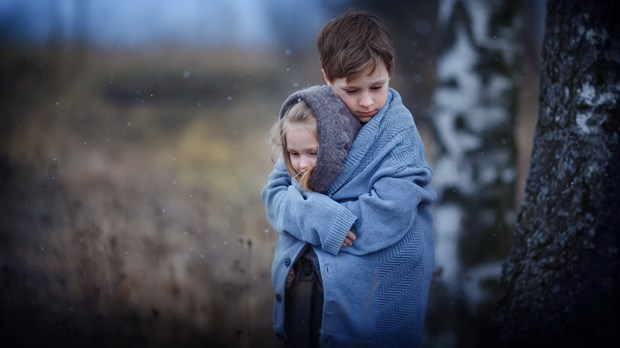When Children Grieve

"Kayley and John," my husband began, "your mom and I have something to tell you. We went to the doctor today to see if everything was okay with the baby ? " He took a deep breath as four big blue eyes watched him closely.
"Guys," he said gently, "the baby died."
Just hours before, a doctor had told us the baby I'd been carrying for five months had died. All afternoon I worried about how we would tell our two older kids. My grief was intensified knowing how sad they would be, especially our 7-year-old daughter, who had prayed earnestly that I would conceive this baby.
"It's okay to cry, Sweetie," I said to her, as the flood of tears began.
Grief. It's hard enough for grownups to deal with, but when our kids' hearts break, the load seems unbearable. Adults know that death, pain and loss are inevitable. But how do we explain that to our kids?
Although death is generally the most painful form of loss, we grieve hundreds of "little" losses throughout our lives. Families move, parents get divorced, a beloved pet dies, a big sister goes to college ? and a child grieves. These events may not be equally traumatic, but each loss is significant in the eyes of a child. Though we can't prevent loss, there are things we can do to help our kids bear the load and even grow stronger because of it.
Prepare Now for Future Losses
When my 5-year-old asks if he will die, my first impulse is to tell him not to talk that way. But I wouldn't be doing him any favors if I pretended that death isn't a reality.
In Helping Kids through Tough Times (Standard), Doris Sanford writes, "The spiritual and emotional growth available for children after a death is a result of facing the pain, not avoiding it." Even if your children haven't experienced grief yet, look for opportunities to talk about loss and death. Children's books, television shows, even current events can open doors to helpful conversation. By discussing these issues with your children, you let them know that no subject is off limits. Then, when a loss does occur in your child's life, you'll have already begun to prepare her for a healthy grief process.
In John 16:33, Jesus tells us trouble in this world is inevitable. Rather than trying to keep our children's lives pain-free, we are wiser to lay a strong spiritual foundation before crisis strikes.
When Nancy, a 56-year-old mother of three, was 13, her mother died suddenly of a brain aneurysm.
"I am so thankful for the time my mom invested in helping me memorize Scripture," she says.
Deuteronomy 6:7 reinforces the need to share God's commandments with our families: "Impress them on your children. Talk about them when you sit at home and when you walk along the road, when you lie down and when you get up."
Help your children memorize verses they can use to fight life's battles later on.
Recognize Their Pain
Our kids will grieve over things that seem minor to us, but it's important to recognize their pain. Think back to what it was like to be a kid. Taking second place in the science fair might not seem like a big deal to an adult, but to an 8-year-old, it feels like the end of the world.
The death of a pet is often a child's first experience with grief. When Karen, a 32-year-old mother of two boys, was in third grade, her kitten had to be put to sleep. "I fell apart at the vet's office," she says now. "I remember my mom telling me we'd get another one, but I loved that kitten."
Let the Tears Flow
In an effort to help our kids feel better, we often wipe their tears, telling them, "Shhh, don't cry." In fact, crying is a healthy part of healing. Even Jesus wept when his friend Lazarus died?and Jesus knew he'd be bringing him back to life! Tears are a gift from God, not a sign of weakness.
When I told my daughter that one of her best friends would be going to a different school in the fall, she laid on her bed and cried. My first tendency was to point out all the friends she had left. But it was important that she grieve this loss. It's not always my job to take away the hurt, but I can offer an empathetic, listening ear.
Focus on Their Needs
When the whole family's in the midst of a crisis, it's easy to forget that children need special attention.
When my husband was 12, his father lapsed into a sudden coma. For reasons he doesn't completely understand, my husband's mom failed to take him and his 9-year-old brother to visit their dad in the hospital. The next time they saw him was in a funeral home.
"In hindsight, I think that caused some bitterness and resentment ? and actually prolonged the grief process for me," my husband says now.
The circumstances surrounding a death, serious illness or even a move can be confusing for children. Allowing them to visit a loved one in the hospital, help plan a funeral or make decisions about some aspects of a move will give them a sense of security and help them cope more easily. If you're not sure what your child needs, just ask. Then take the time to listen and respond appropriately. If you aren't able to answer questions or talk freely because of your own grief, ask a trusted family member or friend to help you.
Follow Your Child's Lead
When children are afraid or confused, they ask a lot of questions. "Be simple, accurate and brief," says Marguerita Rudolph, author of Should the Children Know? (Shocken Books). Avoid using euphemisms such as "Grandpa went to sleep." This only confuses children further and gives them misconceptions about death. They need to be able to trust you completely, and telling them lies or half truths interferes with their ability to believe everything else we say.
But on the flipside, be careful not to share too much information. In an effort to be completely honest with my daughter when our baby died, I began to explain to her what would happen to the baby's body. But I stopped short when I realized this was probably more information than she needed. Instead I said simply, "The hospital has a special place for babies who have died." This was all the answer she wanted.
Celebrate Your Hope in Heaven
In 1 Thessalonians 4:13, Paul says, "We do not want you to be ignorant about those who fall asleep, or to grieve like the rest of men, who have no hope." This verse doesn't tell us not to grieve, but tells us to grieve with hope.
Parents can share this hope of heaven with their children. If your child hasn't made a commitment to follow Christ, a crisis is a wonderful opportunity to share the gospel.
Also, share stories of loss from your own childhood. Tell how God worked in your life and used the situation to help you grow. Read James 1:2-12 together and discuss how trials can make us stronger. Remind your children that even though we have trouble on earth, Jesus has overcome the world (John 16:33) and that God promises he'll never leave us (Heb. 13:5).
Finally, celebrate with your children the promise of heaven. Revelation 21:4 says, "He will wipe every tear from their eyes. There will be no more death or mourning or crying or pain, for the old order of things has passed away." Those words offer enormous comfort in the midst of pain.
When I was 16, an acquaintance was killed in a car accident. It was my father who helped me grieve. He went with me to the funeral home and took off work to sit next to me at her memorial service. He didn't have all the answers, but he gave me something I'll always treasure?the gift of his presence. Grief is hard work. But with your help, your child can learn to face loss with hope and strength.
Joanna Bloss lives in McPherson, Kansas, with her husband, Rob, and their three children.
Best Books for Tough Times
- Mommy, Please Don't Cry (Multnomah), by Linda DeYmaz. This is a picture book written for mothers who have lost a child. Since it's written from a child's perspective, it's also meaningful to share with children who are grieving the death of a sibling or friend.
- Someday Heaven (Gold 'n' Honey), by Larry Libby. Intended for parents to share with children, this book contains questions and answers about heaven, such as: "Where is heaven?" "Will my pets be in heaven?" "Will my grandpa still be old in heaven?"
- Helping Kids through Tough Times (Standard), by Doris Sanford. This book contains reproducible discussion guides for adults who are helping children deal with a variety of difficult issues including grief, fear, moving, divorce and loneliness.
- Heaven's Not a Crying Place(Revell), by Joey O'Connor. Read this before and during a crisis situation. It includes helpful tips for talking to children about death and dealing with terminal illness.
1999 by the author or Christianity Today/Christian Parenting Today Magazine.
Read more articles that highlight writing by Christian women at ChristianityToday.com/Women
 Read These Next
Read These Next
 Fall TV for FamiliesIs there anything worth watching?
Fall TV for FamiliesIs there anything worth watching? Carla's QuestFormer CPT editor Carla Barnhill searched for "the perfect mother"— and ended up redefining the roles—and worth—of weary Christian moms instead.
Carla's QuestFormer CPT editor Carla Barnhill searched for "the perfect mother"— and ended up redefining the roles—and worth—of weary Christian moms instead.









 Homepage
Homepage